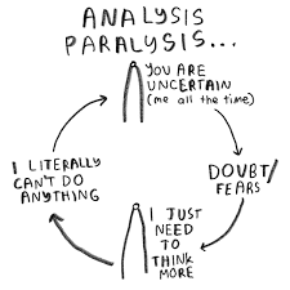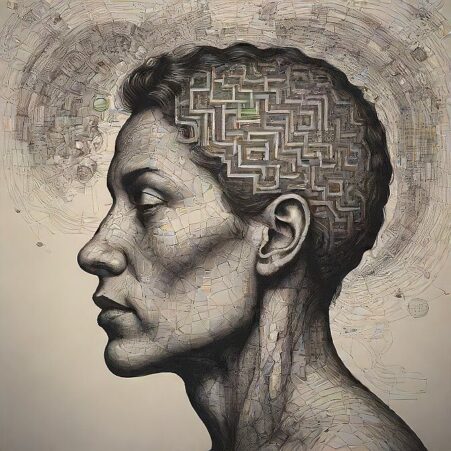Self-Awareness For Millennials and Gen Z: No Adulting Meltdowns
Self-awareness for Millennials and Gen Z has been contaminated by outdated self-help gurus who claimed to have it all figured it out. This post is going to change that.
Why do we need to talk about it?
Because self-awareness is a key part of understanding yourself. Without it, there is only the shell of you.
It is the holy grail of adulting, right up there with finally mastering the art of adult swim (turns out splashing around like a kid doesn’t actually count as exercise).
Sadly, a study from Harvard Business Review showed that only 10-15% of people have a high sense of self-awareness.
The same study found that those with high self-awareness are less likely to lie, cheat, and steal, make poor decisions, have weaker or toxic relationships, and communicate less effectively.
So in summary, self-awareness is critical for personal and professional success.
However, we live in a world where the constant pressure to #adult and the highlight reels everyone seems to be living in, figuring out who you really are can feel like a major side quest.
Ever feel like you’re living life on autopilot, scrolling through perfectly staged feeds and wondering, “Wait, is this even me?”
We all had such moments.
But hold on – self-awareness isn’t some boring psychobabble trend. It’s the ultimate power move we Millennials and Gen Z can pull to navigate this crazy world with purpose and confidence.
This guide is the modern no-BS roadmap for us Millennials and Gen Z, the hyper ambitious and occasionally socially awkward.
We will have a deep dive into the why, what, and how of self-awareness with research and practical insights all delivered in a way that’s more late-night friend chat than a dusty textbook.
One thing to note here is that this blog is not self-help driven (because self-help sucks!) This is a science-based hub to enable you to bring and live your most ideal self and life), hopefully.
Let’s get started.
1. What is Self Awareness
Self-awareness is the ability to understand yourself.
This includes your thoughts, feelings, values, beliefs, and actions. As simple as that.
A key aspect of self-awareness is being able to see yourself objectively.
This means recognizing your strengths and weaknesses, and how your thoughts and behaviors align with your values
One thing to note here is that self-awareness is not about having a perfect understanding of yourself, but rather a willingness to keep reflecting and learning about yourself.
The point is: Self-awareness is like having a hilarious inner voice that roasts you for your bad choices, but also helps you make better ones by understanding your why.
It’s not about being perfect, it’s about catching yourself before you raid the donut box (or metaphorically crash and burn).
2. Development of Self-Awareness
2.1 Exploring Self-Awareness Theory
Self-awareness theory, developed by Duval and Wicklundis, is all about understanding how we think about ourselves, plain and simple.
Imagine looking at yourself in a mirror and thinking about your thoughts, actions, and experiences.
This theory says that when we focus on ourselves, we compare our behavior to what we believe is correct.
This comparison helps us change our behavior and feel either proud or dissatisfied with ourselves.
Research suggests that when you pay attention to yourself, you try harder to meet your standards and have stronger emotional reactions when you succeed or fail.
In other words, when you are not focused on yourself, your actions may not align with your personal standards.
Therefore, self-awareness is crucial to bridge the gap between your actions and your ideals.
In fact, studies have shown that self-awareness is related to cognitive abilities such as working memory, processing speed, and reasoning.
For example, more self-aware individuals tend to perform better on cognitive tests that require them to hold and manipulate information in their minds.
Now, while some believe that self-awareness helps us see ourselves more clearly, others argue that it can also exaggerate and bias our judgments about ourselves.
The key concepts of self-awareness theory is that at any given moment, a person can be self-focused or other-focused.
Here is what this means:
Imagine you’re at a party. Self-awareness theory says you can be in two modes:
- Self-focused: This is like having a spotlight on yourself. You’re thinking about how you look, what you’re saying, and how others might perceive you.
- Other-focused: Now the spotlight is on everyone else. You’re paying attention to the conversations, having fun, and making new connections.
Basically, self-awareness theory says you can’t be super focused on yourself and everything else at the same time. It’s a mental switch between “me” and “we.”
2.2 The 5 Levels of Awareness
The 5 Levels of Self-Awareness by Rochat describes the development of our self-awareness as we progress from infancy to adulthood.
Here’s a summary of these levels with examples to make it stick:
- Level 1: Body Awareness: This is the basic level of self-awareness where you become aware of your own body and its movements.
For example, when you first start to recognize yourself in a mirror and how you look or move. - Level 2: Self-Other Differentiation: At this level, you become aware of yourself as separate from others.
For example, when you begin to develop a sense of individuality and independence from your parents or siblings. - Level 3: Emotional Awareness: (leveling up now). This level involves the ability to recognize, regulate, and experience your own emotions like happiness, sadness, or anger, and learn to manage them in healthy ways.
- Level 4: Evaluative Awareness: At this level, you become aware of how others perceive you and develop a sense of self-esteem.
For example, you relate to this level when you receive feedback from your peers or supervisors at work, or when you compare yourself to others on social media. - Level 5: Meta-Cognitive Awareness: (God mode). This is the highest level of self-awareness, where you become aware of your own thought processes, deep in introspection, aware of biases, and can reflect on your consciousness.
Basically, you’re Yoda without the backward talk.

3. The Science of Self Awareness: Let’s Get Nerdy a Bit
3.1 How the Brain Builds Self-Awareness
It all comes down to one primary region: The anterior cingulate cortex (ACC). It plays a critical role in self-awareness development.
The ACC is influenced by both genes and environment, with genes and parenting methods interacting to influence self-regulation.
Let’s focus on what it does here and leave the complicated neuroscience for another day.
The ACC is involved in various functions related to self-awareness, such as self-regulation, emotion regulation, and cognitive control and it is particularly important for conflict-monitoring and response-selection and execution.
The ACC is also involved in emotional appraisal, autonomic integration, and affect related to pain.
The development of the ACC is an essential step in the social and emotional development, as it is at the center of the brain’s self-regulatory system, integrating inputs from diverse sources in order to regulate responses and guide behavior.
Perhaps the most interesting thing here is that the ACC is sensitive to both reward and pain, and evidence suggests that it is involved in cingulate coupling to cognitive and emotional areas during task performance.
Think of it as your brain manager: It helps you regulate your emotions, make decisions, and avoid going full meme-worthy meltdown in public or double-texting your ex at 3 am.
Now that’s a superpower everyone can appreciate.
3.2 Self-Awareness and Metacognition
Now that you know what self-awareness is, metacognition is closely linked to it,
Metacognition is simply the process of thinking about your own thinking.
It’s the ability to reflect on your cognitive processes and monitor how well you understand something.
It’s like being aware of your own mental map and how well it guides you.
Here’s an analogy:
Imagine you’re on a road trip. Self-awareness is like knowing your destination and having a general idea of the route.
Metacognition is like checking the map regularly, understanding your current location, and adjusting your course if needed.
Self-awareness is a foundation for metacognition. You can’t effectively reflect on your thinking processes if you don’t have a good grasp of yourself in the first place.
For example, if you’re unaware that you tend to get anxious during tests, you won’t be able to develop strategies to manage that anxiety and improve your performance.
Metacognition helps you with self-awareness too!
By reflecting on your thoughts and learning styles, you can gain a deeper understanding of your strengths and weaknesses as a learner and an individual.
Here are some benefits of strong self-awareness and metacognition:
- Improved learning and problem-solving
- Better decision-making
- Stronger emotional regulation
- More effective communication
- Increased self-confidence
So to put it all together, self-awareness is knowing yourself, and metacognition is the awareness of how that knowledge affects your thoughts and actions.
They work together to create a powerful toolkit for navigating life’s complexities.
The more aware you are of yourself, the better your overthinking patterns will be. Otherwise…

3.3 Self-Consciousness: The Downside of Self-Awareness
Self-awareness is a great thing, but sometimes it can backfire. Self-consciousness is the negative side of self-awareness. Put simply.
Culturally, self-consciousness is when you become overly sensitive about yourself in front of others, leading to unpleasant and discomforting feelings.
Scientifically, it is the study of how the brain perceives the body and translates that perception into conscious experience which can be altered by everyday experiences, injury, and neuropsychiatric conditions.
So pick what suits your preference.
While self-awareness is the ability to observe and accurately identify your thoughts, feelings, and impulses, self-consciousness is the excessive concern about how others perceive you.
This can lead to self-doubt, low self-esteem, social anxiety, negative self-talk, a poor self-image, and avoidance behaviors in social situations.
This creates a cycle of self-doubt and anxiety that further reinforces negative self-evaluation.
Here is an example:
Imagine you’re giving a presentation.
- Self-awareness helps you prepare well and deliver your message clearly.
- But self-consciousness makes you overthink every word, worry about your outfit, and imagine everyone judging you which affects your performance and self-esteem.
We all have been there in one way or another, the great thing is that this is relatively easy to fix.
Here are some notes to start with:
- The illusion of transparency: Stop thinking that others can tell exactly what you feel or think.
Sometimes people just don’t voice out their things because they think it’s obvious, but it’s not always.
Apply this to public speaking for example (we think they see we are nervous, but most of the time, they are not). - Focus on your message, not yourself: When presenting, focus on the information you’re sharing, not how you’re perceived.
- Challenge negative thoughts: If you think everyone hates your outfit, ask yourself for evidence. Maybe it actually looks great!
- Practice self-compassion: Everyone makes mistakes. Treat yourself as if your best friend just made a mistake. Therapy also something to consider.
“The only person you are destined to become is the person you decide to be.” – Ralph Waldo Emerson

The Two Types of Self-Awareness: Understanding Your Inner and Outer World.
Self-awareness can be broken down into two distinct types: private and public self-awareness.
Private self-awareness refers to your ability to understand and reflect on your internal state, such as thoughts, emotions, and values even if they are not visible to others.
It helps you understand your:
- Thoughts: What are you thinking about right now? Are these thoughts helpful or holding you back?
- Emotions: What are you feeling? Can you identify the root cause of those emotions?
- Values: What truly matters to you? What principles guide your decisions?
- Motivations: What drives you? What are your deepest desires?
Public self-awareness, on the other hand, refers to your ability to understand how others perceive you and to recognize how your behavior affects those around you.
It helps you to see:
- How others perceive you: Do your actions align with the image you want to project?
- Social cues: Are you picking up on how others are feeling?
- Impact of your behavior: How do your words and actions affect those around you?
The key point here is to strike a balance.
- Too much inner focus can lead to overthinking and social anxiety.
- Too much outer focus can make you inauthentic or overly concerned with other people’s opinions.
Personal Insight: I’d argue that there is no selfishness in focusing more internally than externally first because that will help us to really face the shadow of our personality first and integrate them in a healthy matter before society imposes an inauthentic image about who we truly are.
According to a study published in 2015, 37% of teens were found to experience an identity crisis at some point in their lives.
Among many reasons, now you know why it is healthy to start inwardly.
The Benefits of Self-Awareness
- Improved Self-Control: As mentioned earlier, self-awareness can lead to improved self-regulation and self-control, helping us understand social norms and behave in socially acceptable ways.
- Better Decision-Making: Self-awareness enables us to make better decisions by understanding our values, thoughts, and emotions.
This makes our thinking clearer and improve decision-making. - Better Relationships: Self-awareness fosters better relationships by helping us communicate more assertively, honestly, and truthfully. (I bet your friends will like that!).
- Increased Productivity: Self-awareness helps us eliminate hidden obstacles to productivity by addressing internal thoughts, emotions, and habits that may hinder our performance.
- Healthier Body and Mind: Less stress and anxiety. Being self-aware of physical and emotional needs leads to better self-care choices, such as improved physical health habits and mental well-being practices.
- Increased Happiness: Ultimately, self-awareness helps us live a more authentic and fulfilling life.
It allows us to make choices that align with our values, build strong relationships, and cultivate inner peace.
This sense of authenticity and purpose can lead to greater overall happiness and well-being. - Empowerment and Personal Growth: Being aware allows us to clarify our values, behaviors, strengths, and weaknesses. All of which can help us decide what to focus on.
It is proven that self-aware leaders make smarter decisions, are more creative, and confident, and have better relationships and overall career progression and less impostor syndrome.
Being self-aware is like finally realizing all those thirst traps you posted in high school were a cry for help, not hot girl summer.
It helps you avoid future social media regrets and maybe even post something relatable for once.
Too much? 🙂

Barriers to Self-Awareness
Barriers to self-awareness are obstacles that prevent us from accurately understanding our own thoughts, feelings, and behaviors.
Here are some common barriers to self-awareness according to research:
- Cognitive biases: Our brains are wired with shortcuts (biases) that distort reality. These biases can lead to a rosy view of ourselves.
We may fall victim to the self-serving bias, attributing successes to our abilities but blaming failures on external factors.
Similarly, confirmation bias reinforces pre-existing beliefs, causing us to interpret feedback selectively, ignoring information that contradicts our self-image. - Lack of feedback: Without honest feedback, we lack perspective. Surrounding ourselves with “yes-men” or fearing negative feedback can create an echo chamber, reinforcing an inaccurate self-image.
- We don’t interpret correctly: Even with feedback, misinterpreting it is a hurdle. We need to consider the context and motivation behind the message.
Was the feedback delivered with genuine concern, or was it colored by anger or resentment? Did it address a specific behavior, or was it a personal attack? - Fear of unpleasant emotions: We may unconsciously avoid self-awareness to shield ourselves from feelings of inadequacy, shame, or insecurity that come with change.
All in general might dismiss life-changing growth opportunities. - Habits and routines: Habits and routines can lull us into complacency. Self-awareness requires questioning “why” behind our actions.
- We don’t LISTEN!: When we have an idea inside our heads, it is almost always the case that no one will talk us out of it.
So many biases here like conformation bias and sunk cost fallacy to name a few. - Distorted societal messages: This one I dislike the most. Societal expectations and norms can distort our self-perception.
Unrealistic beauty standards, relentless comparisons on social media, and narrow definitions of success can all contribute to a distorted self-image.
Critical self-awareness requires questioning societal messages and defining success on our own terms.

How to Improve or Develop Self-Awareness
Here are some practical and scientific ways to develop or improve your self-awareness:
- Daily check-ins: Take a few minutes each day to reflect on your thoughts, emotions, and behaviors. Ask yourself what went well, what didn’t, and how you can improve tomorrow.
- Feedback from others: Seek feedback from trusted friends, family members, or colleagues. This can help you understand how others perceive you and identify areas for improvement.
- Identify your values: Try to clarify your personal values and use them as a guide for decision-making and behavior.
- Read fiction: Actually, studies have shown that reading fiction can help you understand different perspectives and emotions, which can improve your self-awareness.
- Practice gratitude: Focusing on what you’re grateful for can help you develop a deeper awareness of your connection to the world around you.
- Examine your knee-jerk reactions: Take time to reflect on your emotional responses and consider what might be underlying them.
Basically, what really flips you off? There is an underlying feeling behind it to clarify and address. -
Challenge your assumptions: Don’t take your thoughts and feelings as absolute truths. Question why you think or feel a certain way, and explore alternative perspectives.
- Practice mindfulness meditation: Pay attention to your thoughts and feelings without judgment.
Mindfulness exercises like meditation, journaling, and even nature walking can help you become more aware of your present experience. -
Embrace discomfort: You go to the gym frequently because you care about your health and mental state even though it is discomforting.
Self-awareness is the same.
It often involves confronting uncomfortable truths about yourself first.
Don’t shy away from these challenges; they are growth opportunities.
Self-awareness is like hitting ‘restart’ on your life. You might lose some progress, but it’s the only way to fix those glitches and bugs holding you back (and maybe finally beat that level you’ve been stuck on for ages).
Frequently Asked Questions
Conclusion
So, You Want to Be a Self-Awareness Superhero?
Self-awareness isn’t about having all the answers (although it feels pretty dang powerful when you do). It’s about becoming a detective of your own inner world!
By using the tips and strategies outlined, you’ll be on your way to untangling the mysteries of your emotions, thoughts, and motivations. Thats all that matters.
Remember, self-awareness is a lifelong quest, not a treasure hunt with a quick X marks the spot.
But the rewards are epic: better relationships, less stress, and the ability to navigate life’s curveballs with confidence.
Good luck 🙂
If you enjoyed this post, please share it with your friend, I’d appreciate your support as this will help me to keep on going with my mission in tackling modern-day struggles we Millennials and Gen Z face with the latest in culture and science.
If you want something totally different but equally helpful, check my newsletter below :).
Until next time! Keep growing.



